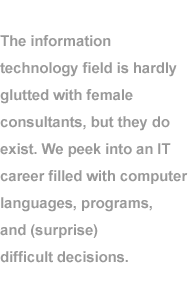 |
|
||||||||||||

|

|
|
By Sacha E. Cohen
|
The information technology industry is hardly drowning in lady-laborers, and if you're in the market for a female IT consultant, much less one who works for herself, well, good luck -- unless you happen to know Tanya Bub. She's both. Somewhat of a curiosity in a male-dominated field, Bub, who works in the booming Washington, D.C., technology corridor, says her gender hasn't hurt her business at all. She says it's actually been to her advantage. "In programming, there's still a sense of novelty about [being a woman] -- in a good way," she says. "You're more visible and people notice what you do a little more." Like many of her male counterparts, Bub, 30, came into her current career accidentally. Her undergraduate training (in philosophy and fine arts) wasn't even remotely technical. Bub got her introduction to computer programming while staying with a tech-savvy friend between leaving her native Canada and enrolling in the Ph.D. program in philosophy at the University of Maryland. She quickly discovered a knack for learning computer languages, and eventually left the academy for a career in computing. In a market that's practically starved for people with her skills, the decision is paying off. Glitches pop up in the tech business like dandelions in April. The crisis du jour on the day that 1099 spoke with Bub concerned a website she had developed for school children to use in classrooms. "Students click in a virtual wetland habitat and a weighted, random selection of critters pops up," says Bub. Bub was leading a demonstration of the site -- in the afternoon, as fate would have it, when Internet traffic is highest and web pages load slowest. Dozens of animated children were toying with the site at the same time. "The 'catches' weren't coming up fast enough," says Bub, "so they were clicking on the imagemap repeatedly and as quickly as they could. That bogged down the server even more, causing slower page serving and making the kids click even more." Bub knew that the ISP hosting the wetlands site also hosted hundreds of other sites, and that if any one was drastically slowing down access to the others, the ISP might shut it down. She wasn't about to lose face during a client demonstration, so she quickly transferred the task of computing the children's clicks (requests) from the ISP to the computers the children were using, thus relieving the pressure on the ISP servers. This reduced the likelihood that the ISP would shut down the wetland site, allowed the kids to keep playing, and allowed Bub to see the demonstration to its end. As Bub puts it, "Problem solved, client happy." Bub is, in a word, chill. Her unflappable demeanor makes tense moments and finger-biting clients fairly easy to deal with, even the most persistent of them. A client who provides online contests for radio stations, for example, calls her every day -- whether he has something to say or not. "At first, it kind of bugged me," says Bub, who has been the radio man's database developer for nearly four months. "But now it's like part of my regular routine. We've developed a close relationship." | |||||||
| ||||||||
|
August 20, 1999 Edited by Eric Gershon Illustration by Lawrence San Production by Keith Gendel |
We'd love to hear your comments about this article! Sacha E. Cohen is a freelance writer who lives in Washington D.C. If you like, we'd be happy to put you in touch with her, or with anyone named in this article. | |||||||
|
| ||||||||
The 1099 name and logo are trademarks of 1099 Magazine.